Looking for the best solar generators for home backup in 2025? I’ve found top options like Jackery’s powerful HomePower 3000, Explorer 2000 v2, and Anker SOLIX models, all offering fast recharging, high capacity, and portability. These systems support essential appliances during outages and can expand for larger needs. If you want to discover which ones fit your home best and how they work, just keep exploring further.
Key Takeaways
- Top solar generators in 2025 feature high-capacity batteries, supporting whole-house backup and essential appliances during outages.
- They offer fast recharging options via solar panels, AC, or gas generators, ensuring quick turnaround times.
- Modern models incorporate durable construction, portability, and safety features like advanced BMS for long-term reliability.
- Expandable systems, such as modular batteries, increase capacity from 2kWh to over 6kWh for extended power needs.
- Leading units combine high wattage output, multiple outlets, and eco-friendly technology for efficient home backup solutions.
Jackery HomePower 3000 Portable Power Station with Solar Panels
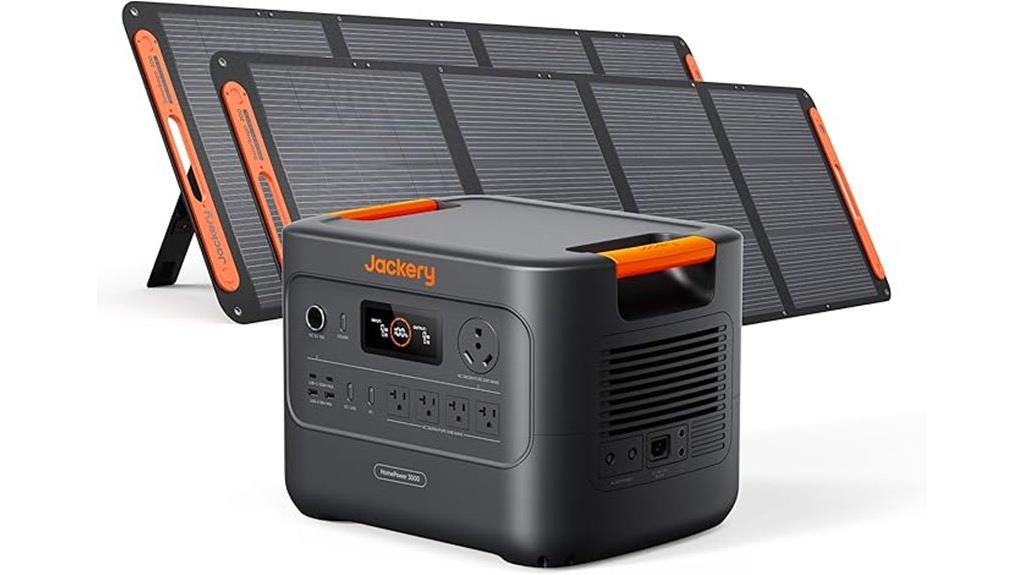
If you’re looking for a reliable backup power solution that can keep your essential appliances running during outages, the Jackery HomePower 3000 Portable Power Station with Solar Panels is an excellent choice. It offers a robust 3600W continuous output and a 3072Wh LiFePO4 battery, making it perfect for home backup, RV trips, or emergencies. Its compact, lightweight design is 47% smaller and 14% more space-efficient, thanks to CTB technology. With rapid recharging options—including hybrid AC/DC in just 1.7 hours—and support for solar, car, or gas generator charging, it guarantees you have power when you need it most.
Best For: homeowners, RV enthusiasts, and emergency preparedness individuals seeking a reliable, high-capacity portable power solution with fast recharging and versatile charging options.
Pros:
- High 3600W continuous power output with surge capacity up to 7200W, supporting multiple devices simultaneously.
- Rapid recharging in just 1.7 hours via hybrid AC/DC, ensuring quick turnaround times for power needs.
- Compact and lightweight design with durable honeycomb shell, making it portable and space-efficient for various applications.
Cons:
- Solar panels are shipped separately and may arrive in different packages, requiring additional coordination.
- The product’s high capacity and advanced features come with a higher price point compared to smaller or less powerful options.
- Limited to 30% federal tax credit eligibility, which may vary based on regional policies and utility programs.
Jackery Explorer 2000 v2 Portable Power Station
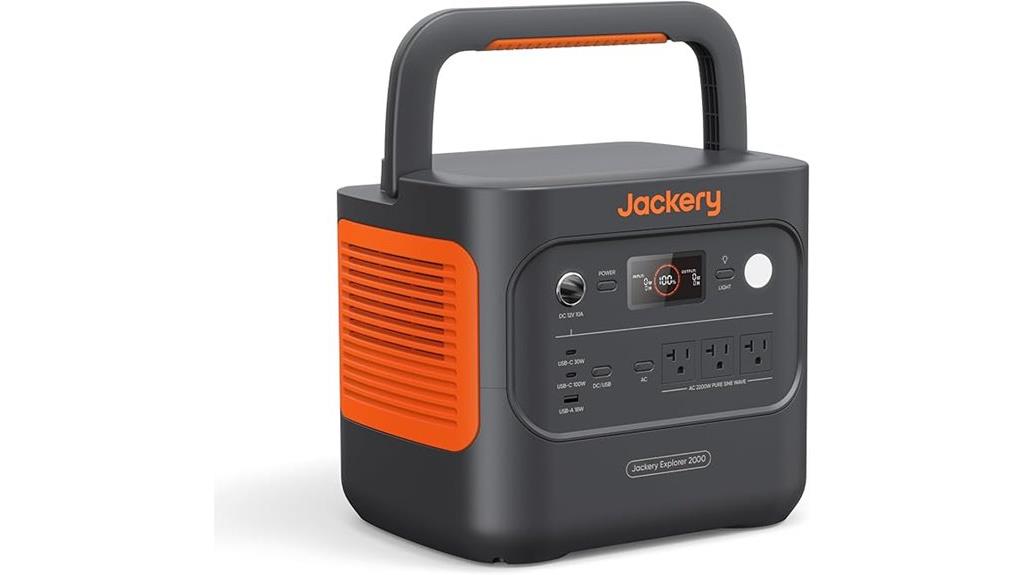
The Jackery Explorer 2000 v2 Portable Power Station stands out as an excellent choice for homeowners seeking reliable backup energy during outages, thanks to its impressive 2042Wh capacity and 2200W power output. Its compact design, weighing just 39.5 lbs, makes it highly portable without sacrificing performance. Equipped with multiple charging options—including rapid AC, solar, and USB-C—it ensures quick and flexible power replenishment. The LiFePo4 battery offers a lifespan of up to 10 years, and its seamless 20ms switching guarantees uninterrupted power. Quiet and safe, it’s ideal for home backup, outdoor adventures, or small business needs.
Best For: homeowners, outdoor enthusiasts, and small businesses seeking reliable, portable backup power during outages or outdoor adventures.
Pros:
- High capacity of 2042Wh with 2200W power output for versatile use
- Compact, lightweight design at 39.5 lbs, making it highly portable
- Multiple charging options including rapid AC, solar, and USB-C PD 100W for flexible recharging
Cons:
- Relatively heavy for some portability needs despite being lightweight for its class
- Higher initial cost compared to smaller or less advanced power stations
- Limited to 6 hours of solar charging with 400W panels under optimal conditions
Jackery HomePower 3000 Portable Power Station with Solar Panels

The Jackery HomePower 3000 Portable Power Station with Solar Panels stands out as an ideal choice for homeowners seeking reliable backup power during outages. With a 3,072Wh LiFePO4 battery and 3600W continuous output, it can power essentials like fridges, WiFi, and lights for hours or days. Its compact, lightweight design is 47% smaller and more space-efficient thanks to CTB technology, making it easy to store and transport. It recharges rapidly—1.7 hours via hybrid AC/DC—and supports solar, car, or gas generator charging. Its UL-certified UPS guarantees seamless device operation during outages, providing peace of mind when you need it most.
Best For: homeowners seeking reliable, portable backup power for emergencies, outdoor activities, or home use with fast recharge and long-lasting battery life.
Pros:
- High capacity 3,072Wh LiFePO4 battery supports extended power supply for essential appliances
- Rapid recharging in just 1.7 hours via hybrid AC/DC and supports solar, car, or gas generator charging
- Compact, lightweight design 47% smaller and more space-efficient with durable construction and safety features
Cons:
- Solar panels are shipped separately and may arrive in separate packages
- The product’s high capacity and features come at a premium price point
- Limited to specific charging options without additional accessories or panels
Anker SOLIX C1000 Portable Power Station (Optional Solar Panel)
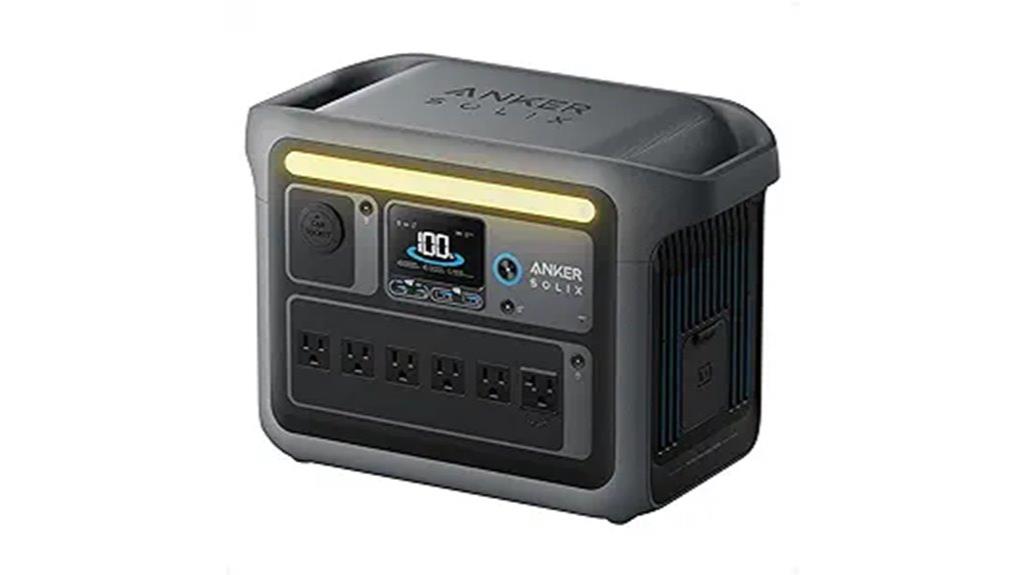
For homeowners seeking reliable backup power during outages or outdoor adventures, the Anker SOLIX C1000 Portable Power Station stands out with its impressive 1800W continuous output and fast recharging capabilities. Its 1056Wh LiFePO4 battery guarantees long-lasting, durable power, supporting around 3,000 cycles for a decade of use. Its compact, lightweight design makes it easy to transport, while the optional solar panel allows up to 600W of quick solar recharging—full in about 1.8 hours. With 11 outlets supporting most household appliances and app control for monitoring, this versatile unit is perfect for both emergency backup and outdoor adventures.
Best For: homeowners, outdoor enthusiasts, and RV users seeking reliable, long-lasting backup power and portable energy solutions during outages, camping, or off-grid adventures.
Pros:
- High continuous output of 1800W with a peak of 2400W, suitable for most household appliances and high-wattage devices.
- Fast recharging via AC in under an hour and optional solar panels up to 600W for eco-friendly, quick off-grid charging.
- Long-lasting LiFePO4 battery offering approximately 3,000 cycles and a 10-year lifespan for dependable, repeated use.
Cons:
- Weighs about 27.6 pounds, which may be heavy for frequent or extended portable use.
- Higher price point compared to basic portable power stations, reflecting its advanced features and battery technology.
- Limited to 120V outlets, which may require adapters for use with other voltage standards in certain regions.
Jackery Explorer 2000 v2 Portable Power Station
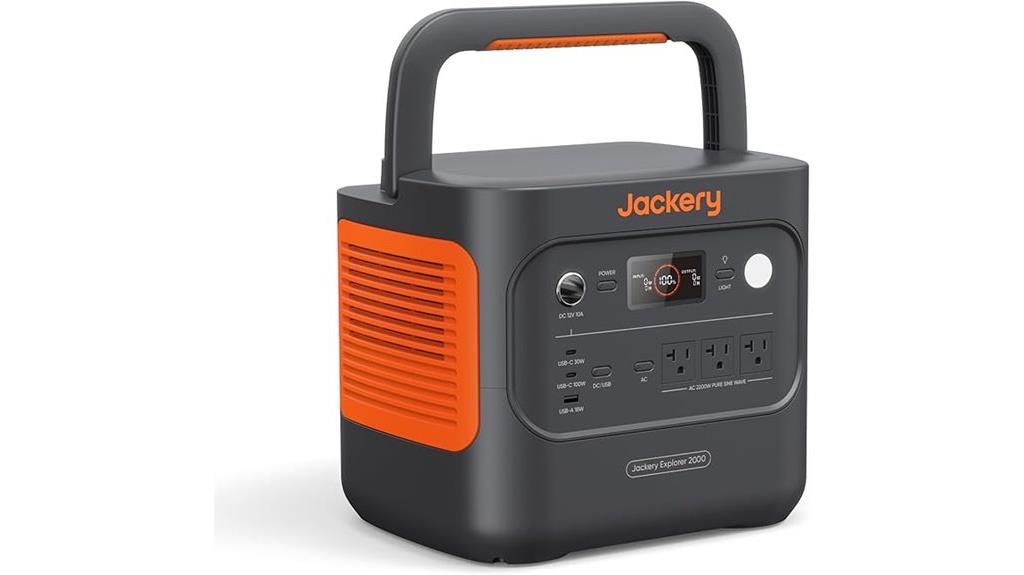
If you’re seeking a reliable, portable power source that can handle home backup needs, the Jackery Explorer 2000 v2 stands out with its impressive 2042Wh capacity and 2200W output. Weighing just 39.5 pounds, it’s the lightest 2kWh LiFePO4 power station, combining power and portability. It offers versatile charging options, including rapid AC charging, solar in about six hours, and silent modes for quiet operation. Its advanced safety features and UL1778 certification make it safe for long-term use. With seamless switching during outages and a lifespan of up to 10 years, the Explorer 2000 v2 provides a dependable, eco-friendly backup solution for home or outdoor use.
Best For: individuals seeking a lightweight, reliable, and eco-friendly portable power solution for home backup, outdoor camping, or small business needs.
Pros:
- Compact and lightweight design at only 39.5 lbs, making it highly portable.
- Fast charging options, including AC rapid charge (0-80% in 66 minutes) and solar in approximately 6 hours.
- Safe and durable LiFePO4 battery with a lifespan of up to 10 years and UL1778 certification.
Cons:
- Limited to 2200W total output, which may not support very high-power appliances.
- Solar charging depends on weather conditions and panel quality, potentially affecting recharge time.
- The 6-hour solar charging time may be lengthy for urgent power needs.
BROWEY Portable Power Station with 1024Wh LiFePO4 Battery

When choosing a reliable home backup solution, the BROWEY Portable Power Station with 1024Wh LiFePO4 battery stands out thanks to its long-lasting, safe, and steady power output. Its award-winning design combines portability with high performance, making it ideal for emergencies, camping, or off-grid living. The built-in solar panel with MPPT controller allows faster solar charging, while the option to connect additional panels boosts efficiency. With a 1600W pure sine wave inverter supporting appliances like refrigerators and CPAP machines, it ensures reliable power. Weighing just 26 pounds, it’s easy to carry, making it a versatile, dependable choice for home backup and outdoor adventures.
Best For: outdoor enthusiasts, homeowners seeking reliable backup power, and off-grid adventurers needing portable, long-lasting energy solutions.
Pros:
- Long-lasting 1024Wh LiFePO4 battery with over 10 years of use and 3000+ cycles at 80% capacity
- High power output with 1600W pure sine wave inverter suitable for appliances like refrigerators and CPAP machines
- Fast recharging options including 3 hours to 80% via AC and USB-C PD, as well as solar charging with MPPT controller
Cons:
- Weighs 26 pounds, which may be heavy for some users to carry over long distances
- Limited to 1024Wh capacity, which might be insufficient for very high power or extended backup needs
- May require additional solar panels for optimal charging efficiency in off-grid scenarios
Portable Power Station, 3840Wh LiFePO4 Battery, 3600W Solar Generator
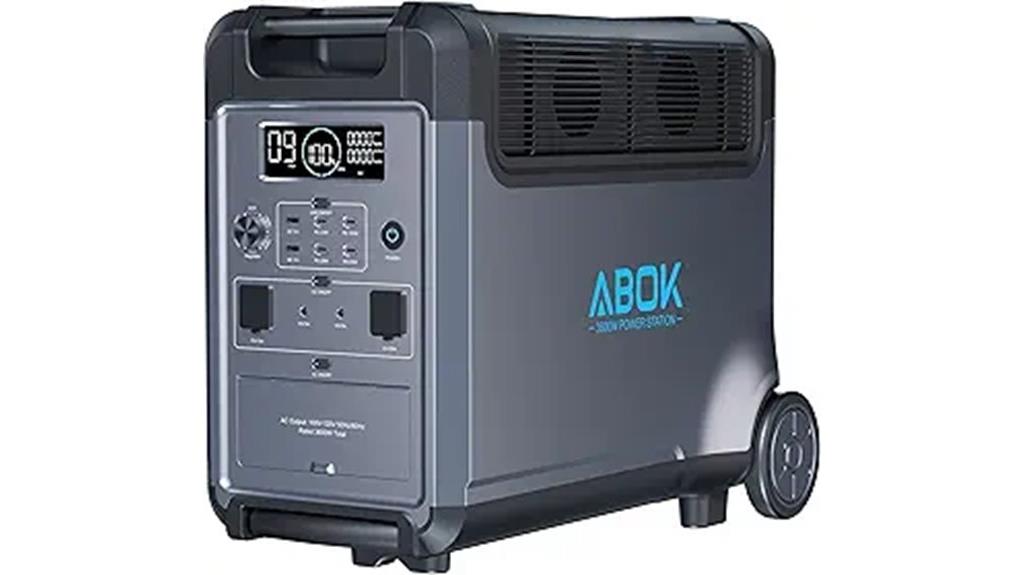
A portable power station with a 3840Wh LiFePO₄ battery and a 3600W solar generator is an excellent choice for anyone seeking reliable backup power during outages or outdoor adventures. Its expandable capacity up to 11520Wh guarantees it can handle multiple devices and long-lasting power needs. With over 4000 cycles, the EV-grade LiFePO₄ cells promise a lifespan of up to 10 years. It delivers a rated 3600W output, supporting most household appliances, and offers fast charging options via AC, PV, or car. Its versatile ports and remote Bluetooth monitoring make it user-friendly, durable, and ready for any emergency or outdoor activity.
Best For: outdoor enthusiasts, campers, and emergency preparedness individuals seeking reliable, long-lasting portable power with versatile charging options.
Pros:
- High-capacity 3840Wh LiFePO₄ battery with over 4000 cycles ensures durability and long-term use
- Fast charging capabilities via AC, PV, or car, fully charged in just over 1 hour with AC + PV
- Multiple output ports support a wide range of devices simultaneously, including household appliances and USB devices
Cons:
- The size and weight may be less portable for some users despite the wheels and telescoping handle
- Higher initial investment compared to smaller or less feature-rich portable power options
- Limited to 2 years warranty, which may be shorter than some competitors’ extended coverage
Anker SOLIX F2000 Portable Power Station

The Anker SOLIX F2000 Portable Power Station stands out as an ideal choice for homeowners seeking reliable backup power during outages or emergencies. With a 2048Wh GaNPrime battery and InfiniPower tech, it’s built to last a decade. It delivers 2400W continuous power, handling high-wattage devices up to 3600W thanks to SurgePad. Supporting rapid charging via HyperFlash, it reaches 80% in just 1.4 hours. Its versatile design includes 4 AC outlets, multiple USB ports, car, and RV outlets, and it’s portable at 67.3 pounds. Perfect for home backup, camping, or RV use, it combines power, durability, and convenience seamlessly.
Best For: Homeowners, outdoor enthusiasts, and RV travelers seeking reliable, portable backup power and high-wattage device support during outages or outdoor adventures.
Pros:
- High-capacity 2048Wh GaNPrime battery with a 10-year lifespan thanks to InfiniPower technology
- Rapid charging with HyperFlash technology, achieving 80% in just 1.4 hours
- Multiple outlets including 4 AC, USB-C, USB-A, car, and RV ports for versatile device charging
Cons:
- Heavy at 67.3 pounds, which may affect portability for some users
- Higher price point reflecting premium features and capacity
- Limited to 120V operation, restricting use in certain regions without adapters
EF ECOFLOW Portable Power Station DELTA 2 Max, 2400W Solar Generator
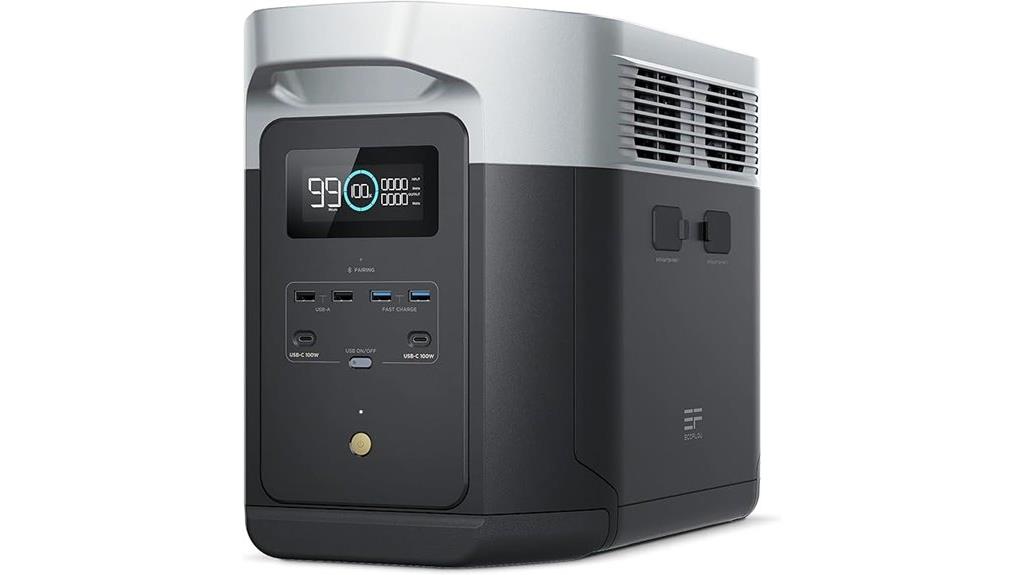
If you need a reliable backup power source that can quickly recharge and handle most household devices, the EF ECOFLOW Portable Power Station DELTA 2 Max stands out. It offers rapid charging—80% in just 43 minutes with up to 1000W solar input or 1.1 hours via AC. Its long-lasting LFP battery delivers 3,000 cycles, ensuring durability over time. The modular design allows expanding capacity from 2kWh to 6kWh by adding extra batteries. With a 2400W output and X-Boost mode, it powers nearly all household devices silently and efficiently. Plus, remote management through the EcoFlow app makes it a versatile, user-friendly choice for home backup needs.
Best For: individuals seeking a reliable, fast-charging portable power station capable of handling most household devices and outdoor essentials with long-term durability.
Pros:
- Rapid charging from solar and AC, reaching 80% in just 43 minutes
- Long-lasting LFP battery with 3,000 cycles, ensuring extended use
- Modular design allows easy capacity expansion up to 6kWh
Cons:
- Higher initial cost compared to basic portable power options
- Slightly heavier and bulkier due to expandable battery modules
- Limited to 2400W output, which may be insufficient for very high-wattage appliances
Jackery Solar Generator 300 with 100W Solar Panel
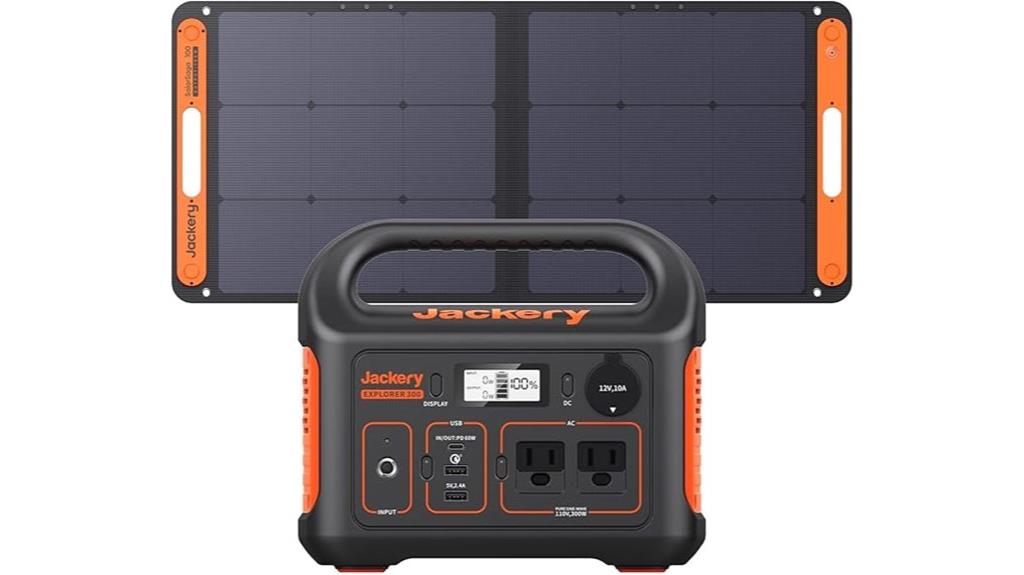
Designed for portability and reliable power, the Jackery Solar Generator 300 with a 100W Solar Panel is ideal for anyone seeking a compact backup solution during outages or outdoor adventures. It features a 293Wh lithium-ion battery and weighs just 7.1 pounds, making it easy to carry. It provides 300W of pure sine wave AC power through two outlets and supports multiple devices simultaneously, including laptops, drones, and cameras. Recharging options include wall outlets, car chargers, or the solar panel, with fast recharge times thanks to its MPPT controller. Its eco-friendly design, safety features, and lightweight build make it perfect for camping, emergencies, or off-grid use.
Best For: outdoor enthusiasts, campers, and emergency preparedness individuals seeking a portable, eco-friendly power source for small devices and sensitive electronics.
Pros:
- Lightweight and compact design weighing only 7.1 pounds for easy portability
- Fast recharging via wall outlet, car, or solar panel with MPPT technology for enhanced efficiency
- Multiple output ports support charging various devices simultaneously, including laptops and drones
Cons:
- Limited battery capacity of 293Wh may not power larger appliances for extended periods
- Only two AC outlets, which could be insufficient for high-demand devices
- Solar panel charging depends on sunlight availability and may take longer in cloudy conditions
Portable Power Station 300W with Solar Generator and Lithium Battery
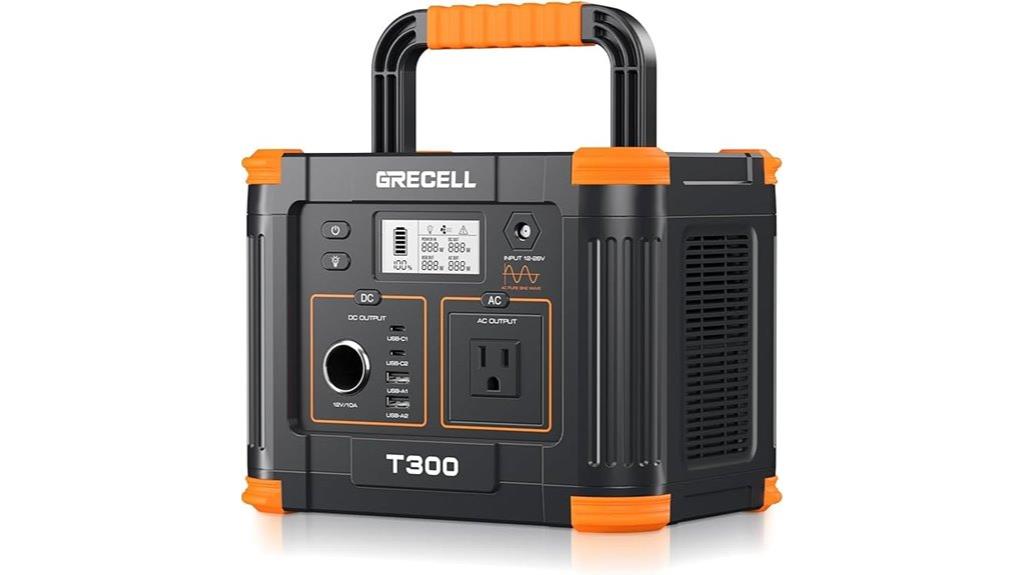
For anyone seeking a reliable backup power source during outages or outdoor adventures, the Portable Power Station 300W with Solar Generator and Lithium Battery stands out due to its compact design and versatile charging options. Weighing just 7.3 pounds, it supports devices under 330W, including laptops, phones, lights, and small appliances. It features a 230.88Wh capacity, multiple outlets, USB-C PD fast charging, and supports solar, AC, and car charging methods. Its advanced BMS guarantees safety, with cooling fans and protections against overload and overcharge. Perfect for camping, travel, or home backup, it delivers reliable power wherever you need it.
Best For: outdoor enthusiasts, travelers, and homeowners seeking a portable, reliable power backup for small devices and appliances during outages or outdoor activities.
Pros:
- Compact and lightweight design weighing only 7.3 pounds for easy portability
- Supports multiple charging methods including solar, AC, and car outlets with fast USB-C PD charging
- Equipped with advanced BMS and cooling fans ensuring safety and reliable operation
Cons:
- Limited to devices under 330W, not suitable for large appliances or high-power tools
- Capacity of 230.88Wh may require frequent recharging during extended use
- Only includes a 40W solar panel, which may charge more slowly compared to higher wattage panels
Jackery HomePower 3600 Plus Portable Power Station
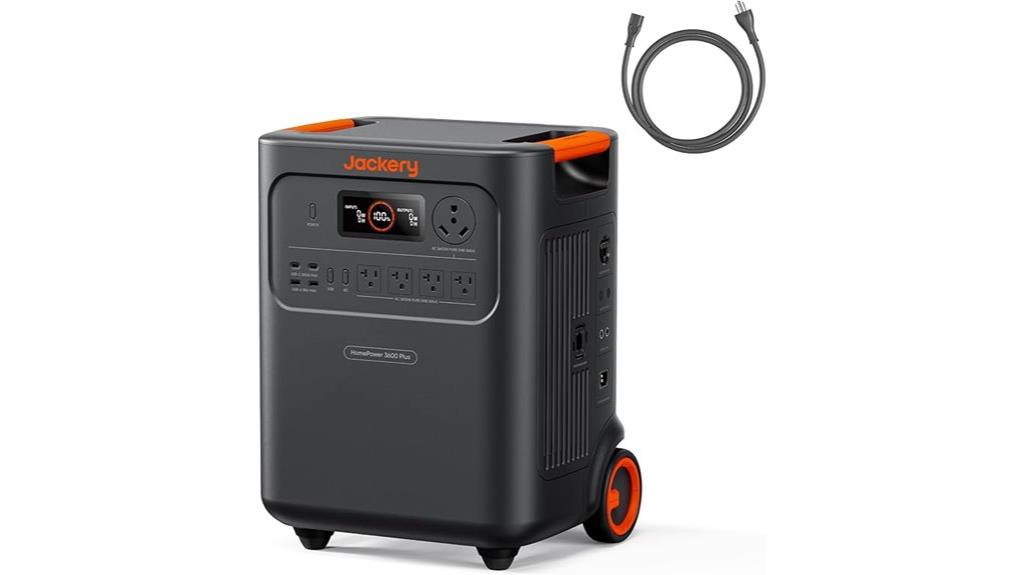
The Jackery HomePower 3600 Plus Portable Power Station stands out as an ideal choice for homeowners seeking reliable backup power during outages or emergencies. With a robust 3600W AC output (7200W in parallel) and a 3584Wh lithium iron phosphate battery, it can power essential devices for over two weeks when expanded up to 43kWh. Its safety features include high-temp resistant cells and a lifespan of 6,000 cycles, ensuring long-term reliability. Recharging is flexible—via AC, solar, or gas generator—and it’s designed for easy mobility with wheels and a telescopic handle. Compact, lightweight, and user-friendly, it’s perfect for both home and outdoor use.
Best For: homeowners, outdoor enthusiasts, and emergency preparedness individuals seeking reliable, long-lasting backup power with flexible recharging options.
Pros:
- High 3600W continuous AC output with expandability up to 43kWh, suitable for whole-house backup
- Advanced safety features including high-temp resistant cells and a lifespan of 6,000 cycles for long-term reliability
- Multiple recharging methods (AC, solar, gas generator) for versatile and eco-friendly energy replenishment
Cons:
- Relatively heavy at 77.2 pounds, which may require assistance for transportation despite mobility features
- Higher upfront cost compared to smaller portable power stations
- Longer charging time via solar (up to 4 hours) compared to traditional AC charging methods
Portable Solar Generator with 60W Solar Panel and 280Wh Battery

If you’re looking for a reliable backup power source that’s portable and easy to use, the ZeroKor Portable Solar Generator is an excellent choice. It features a 280Wh lithium battery and a foldable 60W monocrystalline solar panel, making it perfect for outdoor adventures, camping, or emergency backup at home. With multiple outlets—including AC, DC, USB, and quick charge ports—you can power smartphones, tablets, laptops, and small appliances up to 300W. Recharging options include wall outlets, solar panels with MPPT technology, or carports. Its compact design, safety features, and user-friendly operation make it a versatile, efficient power solution wherever you need it.
Best For: outdoor enthusiasts, campers, and emergency preparedness individuals seeking a portable, reliable power source for small appliances and gadgets.
Pros:
- Compact and lightweight design for easy transport and outdoor use
- Multiple charging options including solar, AC, and carport for versatile recharging
- Built-in safety features like BMS and cooling fan to ensure safe operation
Cons:
- Limited to devices under 300W, unsuitable for high-power appliances like coffee makers or water pumps
- Battery capacity (280Wh) may require frequent recharging during extended use
- Not waterproof; junction box must be kept dry to prevent damage
Anker SOLIX C1000 Gen 2 Portable Power Station
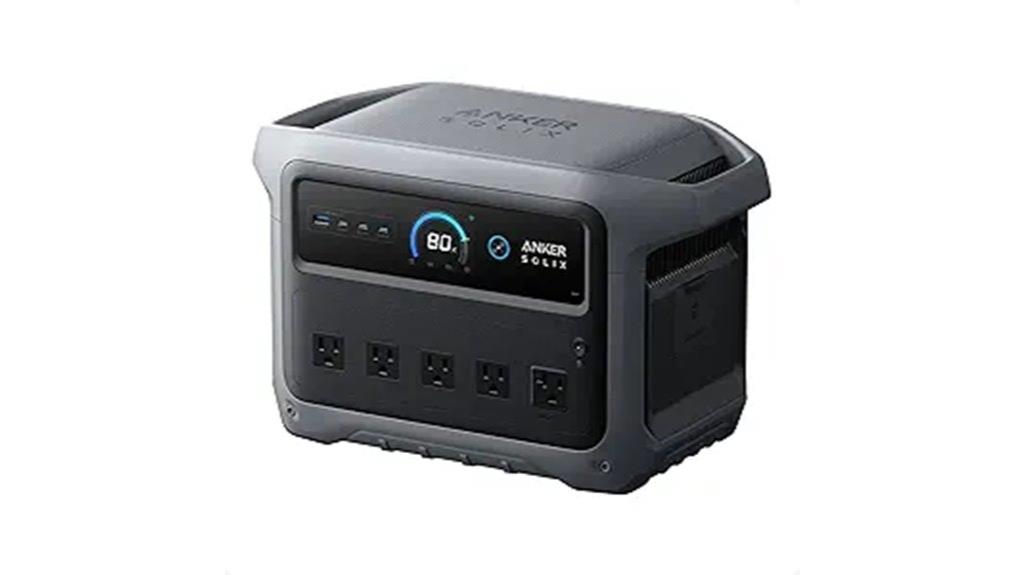
When reliable backup power is essential during outages or emergencies, the Anker SOLIX C1000 Gen 2 Portable Power Station stands out with its impressive 2,000W continuous output and fast recharging capabilities. Its 1,024Wh LiFePO4 battery supports up to 10 devices simultaneously, making it versatile for home or outdoor use. With HyperFlash technology, it fully recharges in just 49 minutes, and solar recharging takes only 1.8 hours via 600W solar input. Compact and lightweight, it’s easy to transport and built to last 10 years with over 4,000 charge cycles. It also features UPS backup and smart management through the Anker app, ensuring dependable power when you need it most.
Best For: those seeking a reliable, portable backup power solution for home emergencies, outdoor adventures, or off-grid living.
Pros:
- High 2,000W continuous power output supports multiple devices simultaneously
- Fast recharging in just 49 minutes with HyperFlash technology
- Durable with over 4,000 charge cycles and a 10-year lifespan
Cons:
- Slightly more expensive compared to basic portable power stations
- Limited to 600W solar input, which may extend recharge times with larger solar arrays
- May be heavier than smaller, less powerful models for ultra-portable needs
EF ECOFLOW Portable Power Station DELTA Pro 3600Wh
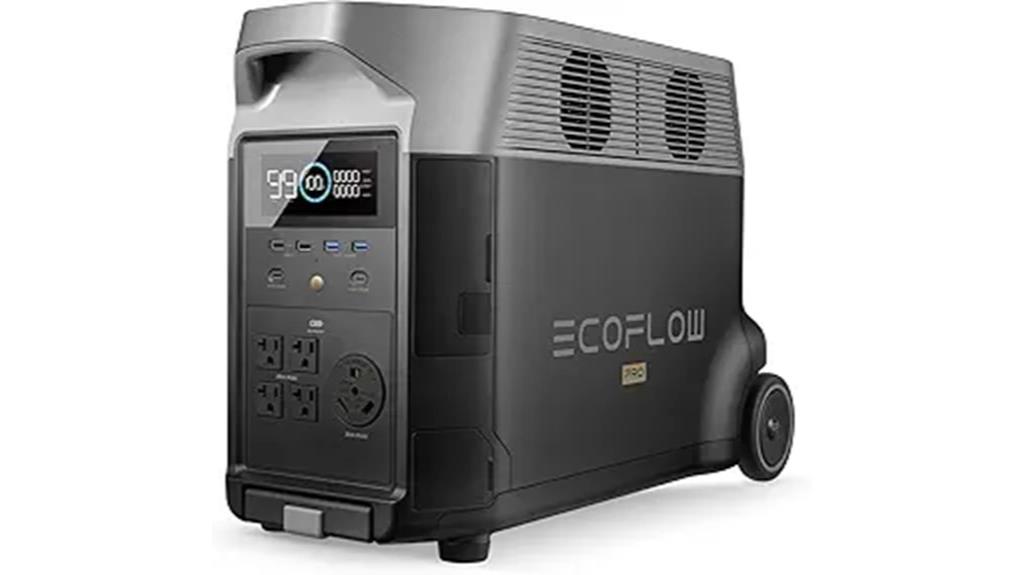
For those seeking reliable, high-capacity backup power, the EF ECOFLOW Portable Power Station DELTA Pro 3600Wh stands out as an excellent choice. With a 3600Wh LiFePO4 battery, it supports multiple devices simultaneously through 15 output ports, including AC, USB, and car outlets. Its max power output reaches 4500W with X-Boost technology, expandable up to 7200W by pairing units or adding extra batteries. Charging is fast—just 1.8 hours via EV station or 2.8 hours with solar panels. Weighing 99 pounds, it’s built for heavy-duty, versatile use at home, outdoors, or during emergencies, ensuring you stay powered when it counts most.
Best For: individuals or families needing reliable, high-capacity backup power for home use, outdoor adventures, or emergency situations.
Pros:
- Large 3600Wh LiFePO4 battery offers dependable, long-lasting power.
- Supports rapid charging in under 2 hours via EV station, solar, or wall outlet.
- Expandable capacity up to 25kWh by pairing units or adding batteries for increased flexibility.
Cons:
- Heavy at 99 pounds, which may be challenging to move frequently.
- Higher upfront cost compared to smaller portable power options.
- Requires space for storage and setup, limiting portability in tight areas.
Factors to Consider When Choosing a Solar Generator for Home Backup
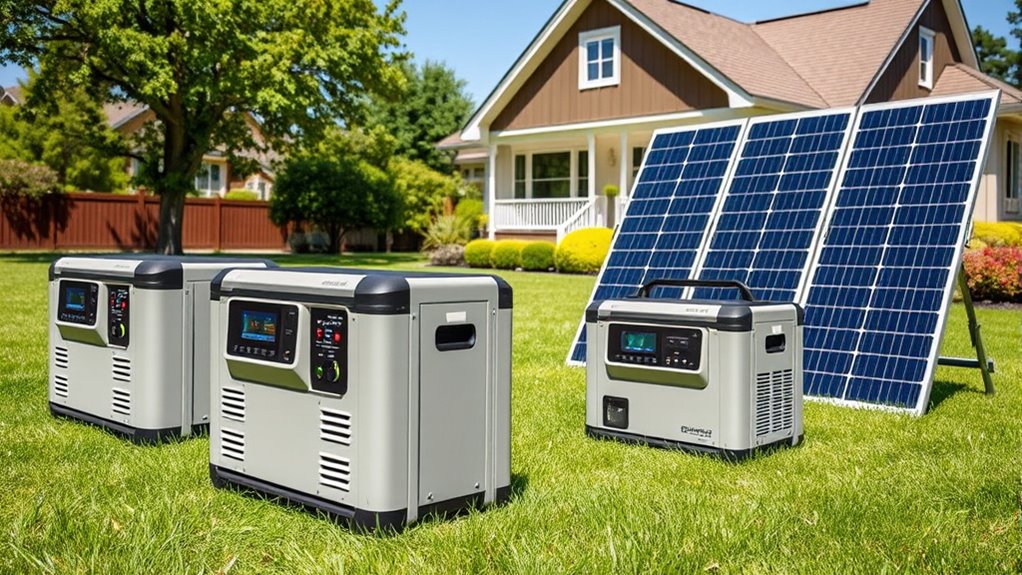
When choosing a solar generator for home backup, I focus on several key factors. I consider how much power I need, how portable the unit is, and how quickly it recharges. Understanding these points helps me pick a generator that fits my home and lifestyle perfectly.
Power Capacity Needs
Choosing the right solar generator for home backup starts with understanding your power capacity needs. I recommend calculating the total wattage of essential appliances you want to run during an outage. Don’t forget to contemplate both continuous wattage and surge wattage, which is the peak power your devices may draw when starting up. It’s wise to select a generator with a capacity slightly above your current needs to allow for future expansion. Keep in mind that higher-capacity units have larger batteries measured in watt-hours (Wh), affecting how long your devices can run. If your backup needs grow, look for options that can expand capacity through additional batteries or modules. Properly evaluating these factors ensures your solar generator will reliably power your home when you need it most.
Portability and Size
Portability and size are crucial factors to contemplate because a generator that’s too bulky or heavy can hinder your ability to move it quickly during emergencies. I look for models with manageable weight—ideally under 50 pounds—that are easy to lift and carry. Compact designs with built-in handles or wheels make transportation smoother, especially if I need to relocate it outdoors or between rooms. Foldable or telescoping handles are a plus, as they simplify handling larger units with higher capacity. It’s vital to find a balance—while you want enough capacity to power your essentials, the generator shouldn’t be so bulky that moving it becomes a chore. Overall, choosing a size that fits your space and mobility needs ensures you’re prepared without sacrificing convenience.
Recharging Speed
Recharging speed plays a vital role in how effectively a solar generator can support your home during power outages. The faster it recharges, the quicker you can restore power and reduce downtime. Some units support rapid charging in under two hours, which is ideal for emergency situations. Solar input wattage also affects recharge times—higher wattage means faster recharging using sunlight. Advanced technologies like HyperFlash or X-Stream can achieve 80% capacity in less than an hour, making them perfect for urgent needs. Keep in mind that the overall recharging speed depends on the compatibility and efficiency of the inverter, solar panels, and hardware integrated into the system. Choosing a generator with fast recharging capabilities ensures you’re always ready when power is needed most.
Battery Longevity
The longevity of a solar generator’s battery is essential for ensuring reliable backup power over the years. A longer lifespan, measured in charge cycles, means the generator remains functional and dependable over time. Lithium Iron Phosphate (LiFePO4) batteries typically deliver over 3,000 to 4,000 charge cycles, far surpassing standard lithium-ion options. However, factors like charging habits, operating temperature, and depth of discharge influence overall battery life. An advanced Battery Management System (BMS) helps protect against overcharging, overheating, and over-discharging, extending the battery’s lifespan. Choosing a solar generator with high cycle counts and robust battery technology offers better long-term value and reduces replacement costs, ensuring your investment remains reliable for years to come.
Device Compatibility
When selecting a solar generator for home backup, it’s essential to evaluate its device compatibility to guarantee it meets your household needs. First, check that it has enough AC, USB, and DC ports to support all your essential devices simultaneously. Pay attention to the continuous and surge power ratings to ensure your appliances can start and operate without overloads. Verify that the generator matches your devices’ voltage and wattage requirements to prevent damage. Advanced inverter technology, like pure sine wave output, is critical for safely powering sensitive electronics. Finally, confirm it supports multiple charging methods—solar, AC wall outlet, and car—so you can recharge flexibly and reliably during outages. Proper compatibility ensures seamless operation and protects your valuable devices.
Expansion Options
As your energy needs grow or during prolonged outages, considering the expansion options of a solar generator becomes essential. You’ll want to check if it supports adding extra batteries or solar panels to boost capacity when necessary. Look at the maximum expandability in kilowatt-hours or wattage to guarantee it can handle future power demands. Compatibility is key—preferably with battery chemistries like LiFePO4, which offer longer cycle life and safety for expansion. Also, verify if the generator provides clear connection ports and integrated control systems, making it easy to integrate additional modules or solar sources. Ultimately, review the manufacturer’s specifications on expansion limits and compatibility to plan a scalable, long-term backup solution that adapts to your evolving energy needs.
Safety Features
Choosing a solar generator for home backup requires careful attention to safety features that protect both your equipment and your household. Essential safety features include overload protection, short circuit prevention, and thermal management, which help prevent accidents and equipment damage during operation. A reliable battery management system (BMS) monitors voltage, current, and temperature, ensuring safe charging and discharging while extending battery life. Certifications like UL or ETL indicate that the device meets strict safety standards, reducing fire and electrical hazards. Built-in surge protection and automatic shutdown mechanisms safeguard your connected devices from power spikes and faults. Additionally, proper ventilation and cooling systems prevent overheating, ensuring safe, reliable operation during extended use. These features give me peace of mind and protect my investment.
Price and Incentives
Price and incentives play a crucial role in selecting the right solar generator for home backup, since upfront costs can vary widely based on capacity and features. The cost can range from a few hundred to several thousand dollars, depending on factors like battery size, solar panel inclusion, and extra features such as fast charging or expandability. Fortunately, there are incentives available, like the federal 30% tax credit for residential clean energy, which can substantially lower the overall expense. Some states or utilities also offer rebates or additional incentives that help offset initial costs. When evaluating options, it’s essential to take into account not just the purchase price but also the long-term savings on energy bills and the value of available incentives to determine the best overall deal.
Frequently Asked Questions
How Long Do Solar Generators Typically Last Before Needing Replacement?
Solar generators usually last between 10 to 15 years before needing replacement, depending on usage and maintenance. I’ve found that regular care, like keeping the batteries charged properly and avoiding extreme temperatures, can extend their lifespan. Most models have a warranty of around 2 to 5 years, but with proper upkeep, they often serve well beyond that. So, investing in quality and maintaining it pays off in the long run.
Can Solar Generators Power All Household Appliances Simultaneously?
Imagine your home as a symphony, and your solar generator as the conductor. It can power many appliances at once, but not every instrument simultaneously. High-worse appliances like refrigerators and HVAC units may need strategic timing. So, while a solar generator can handle most daily needs, juggling power use guarantees everything runs smoothly without overloading the system. Planning wisely keeps your home’s harmony intact.
What Maintenance Is Required to Keep Solar Generators Functioning Optimally?
To keep my solar generator running smoothly, I regularly inspect and clean the solar panels to remove dirt and debris. I also check connections and verify the battery is charged properly, avoiding complete discharges. It’s important to follow the manufacturer’s guidelines for maintenance, like updating firmware if needed. By staying on top of these tasks, I make sure my generator stays reliable and efficient when I need it most.
Are Portable Solar Generators Suitable for Long-Term Home Backup?
Yes, portable solar generators can be suitable for long-term home backup if you select the right model and uphold it properly. I recommend choosing a generator with a high-capacity battery, durable build, and reliable solar input. Regularly check connections, clean solar panels, and monitor battery health to guarantee consistent performance. When maintained well, portable solar generators can efficiently power essential devices during outages over extended periods.
How Does Climate Affect the Efficiency of Solar Generators?
Climate definitely impacts solar generator efficiency. I’ve noticed that in hot, sunny weather, my solar panels produce more power, while cloudy or rainy days reduce output. Extreme cold can also affect battery performance. So, I always consider my local climate when choosing and installing a solar generator. Proper positioning and maintenance help maximize efficiency, no matter the weather, ensuring I get the most out of my solar energy system.
Conclusion
Imagine a storm knocking out your power, but your solar generator kicks in seamlessly, keeping your lights on and fridge cold. That’s the peace of mind a reliable home backup provides. Whether it’s the Jackery Explorer 2000 v2 or the EF ECOFLOW DELTA Pro, choosing the right one can transform how you handle outages. Invest wisely now, so you’re prepared for whatever Mother Nature throws your way.










